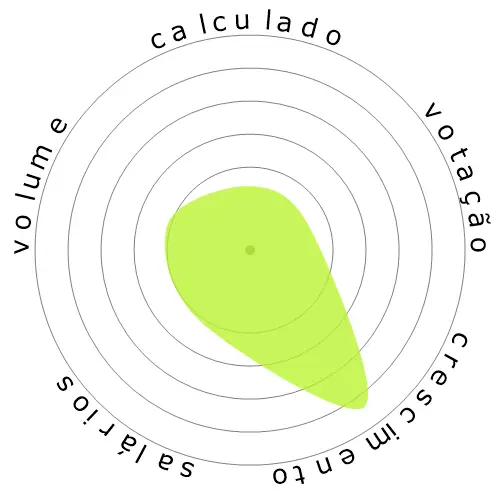Intérpretes e Tradutores




As pessoas também visualizaram
Risco de automação calculado
Alto Risco (61-80%): Empregos nesta categoria enfrentam uma ameaça significativa da automação, pois muitas de suas tarefas podem ser facilmente automatizadas usando tecnologias atuais ou de futuro próximo.
Mais informações sobre o que é essa pontuação e como ela é calculada estão disponíveis aqui.
Enquete do usuário
Nossos visitantes votaram que é muito provável que esta ocupação seja automatizada. O nível de risco de automação que geramos é menos claro e mostra 70% chance de automação.
O que você acha que é o risco da automação?
Qual é a probabilidade de que Intérpretes e Tradutores seja substituído por robôs ou inteligência artificial nos próximos 20 anos?
Sentimento
O gráfico a seguir é incluído sempre que há uma quantidade substancial de votos para gerar dados significativos. Essas representações visuais mostram os resultados das enquetes dos usuários ao longo do tempo, fornecendo uma indicação importante das tendências de sentimento.
Sentimento ao longo do tempo (trimestralmente)
Sentimento ao longo do tempo (anualmente)
Crescimento
Espera-se que o número de vagas de emprego para 'Interpreters and Translators' aumente 2,3% até 2033
Emprego total e estimativa de vagas de emprego
As projeções atualizadas são devidas 09-2025.
Salários
Em 2023, o salário anual mediano para 'Interpreters and Translators' foi de $ 57.090, ou $ 27 por hora
'Interpreters and Translators' receberam 18,8% a mais do que o salário médio nacional, que era de $ 48.060
Salários ao longo do tempo
Volume
A partir de 2023 havia 51.560 pessoas empregadas como 'Interpreters and Translators' dentro dos Estados Unidos.
Isso representa cerca de < 0,001% da força de trabalho empregada em todo o país
Dito de outra maneira, cerca de 1 em 2 mil pessoas são empregadas como 'Interpreters and Translators'.
Descrição do trabalho
Interprete a linguagem oral ou de sinais, ou traduza textos escritos de um idioma para outro.
SOC Code: 27-3091.00


Comentários
Leave a comment
Automation can incredibly speed up the process of translation but human element is a must. Also, in terms of transcreation and localisation for different contexts etc. the AI does not have enough understanding of culture and context regardless of the input.
No not a chance.
Ps : Google translate is still funny, I tried translating 1 sentence into like almost all languages and the sentence was not even close to what I had originally typed. I don't think it's gonna get better
However, we humans are still needed to correct the sometimes amazingly stupid solutions the machine offers when the text is completely new and there are no precedents. Anyway, I would not advise my daughter to choose this profession, except when she likes text editing...
Also interpreters and translators are two very different jobs with different automation risks, I don't think they should be together in one category.
Deixe uma resposta sobre esta ocupação